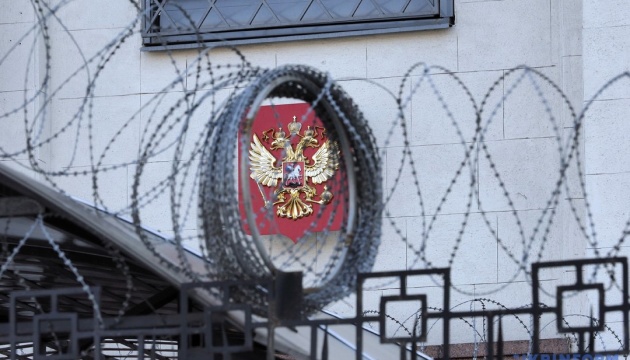EU, Australia and New Zealand Have Adopted New Sanctions Against the russian federation
2/24/2025

The Council of the European Union has adopted the 16th package of sanctions against russia over the invasion of Ukraine by russian troops. The sanctions have been imposed on 48 individuals and 35 legal entities responsible for actions that undermine or threaten the territorial integrity, sovereignty and independence of Ukraine. The EU has sanctioned 74 additional vessels belonging to the russian “shadow fleet”.
The EU has also decided to disconnect 13 russian banks from the SWIFT international banking system. For the first time, the EU has imposed a ban on transactions of credit and financial institutions located outside russia that use the financial messaging system of the russian central bank.
Eight russian media outlets are losing their broadcasting licenses in the European Union. Among them – lenta.ru and zvezda tv channel, which played an important role in promoting and supporting russia's war of aggression against Ukraine, as well as in destabilizing its neighboring countries, the EU and its member states.
The EU has also expanded the list of banned goods that contribute to the technological development of russia's military and industrial complex. The list includes goods for the development and production of russian military systems, such as chemical precursors for chloropicrin and other riot control agents, software for computer numerical control devices, chromium compounds and controllers (game consoles included) used to control UAVs.
Restrictions are also imposed on the export of goods and technologies, including software, related to oil and gas exploration to further limit russia's potential in the exploration and production of these resources.
The EU Council has also imposed new restrictions in Crimea and Sevastopol, as well as in the non-government controlled areas of Donetsk, Kherson, Luhansk and Zaporizhzhia regions to prevent their integration into the russian federation and to prevent circumvention of EU sanctions.
“These restrictions apply to the provision of services in accounting, auditing, tax consulting, business and management consulting, public relations, construction, architecture, engineering, legal advice, information technology consulting, market research and opinion polls, technical testing and analysis, and advertising services,” said the EU Council. In addition, restrictions apply to the provision of certain software for enterprise management, industrial design and manufacturing, as well as related intellectual property rights or trade secrets.
As pointed out by the EU Council, the new sanctions package also includes further restrictive measures against belarus, reflecting the trade sanctions agreed against the rf, as well as other measures, such as restrictions on the sale or provision of services and software, deposits and cryptocurrency wallets, as well as transportation. The Council of the EU has also added another new criterion for listing individuals and entities that are part of belarus’ military and industrial complex, support it, or benefit from it.
On the third anniversary of the russian army's full-scale invasion of Ukraine, the Australian Government has imposed sanctions on 70 individuals and 79 organizations associated with russia. The Government has pointed out that this is the largest package of restrictions that Australia has adopted since February 2022. The new sanctions are aimed at the russian-appointed authorities in the occupied regions of Ukraine, including “so-called ministers, judges and prosecutors”. Restrictions have also been imposed on individuals and legal entities “involved in deepening military cooperation between russia and north korea.”
These include russian-appointed authorities in the occupied territories and russian officials. For example, deputy ministers of defense, putin's cousin’s daugher anna tsivilieva and pavel fradkov, as well as putin's aides vladimir medinsky and aleksei dyumin. In addition, the lists include north korean generals involved in the invasion of Ukraine, including deputy chiefs of staff of the korean people's army kim yong-bok and lee chang-ho.
Sanctions have also been imposed on russian defense, transportation and financial sectors. These include rossotrudnichestvo, rosgvardia, tsentrizbirkom (central election commission – Transl.), alfastrakhovanie, tv-novosti (including russia today and ria novosti), rossiyskaya gazeta, and the internet development institute, which provides grants for pro-government content. Australia has imposed a total of more than 1,400 sanctions in response to russia's full-scale invasion of Ukraine.
New Zealand has also imposed sanctions to the third anniversary of the war. According to the country’s Ministry of Foreign Affairs, the restrictions have affected 27 individuals and 25 legal entities. They include russian companies involved in exports of energy carriers and north korean officials helping moscow. In total, since February 2022, New Zealand has blacklisted more than 1,700 individuals and legal entities, and has adopted a number of trade restrictions on russia.
